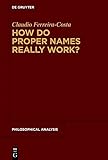How Do Proper Names Really Work? : A Metadescriptive Version of the Cluster Theory / Claudio Ferreira-Costa.
Material type: TextSeries: Philosophical Analysis ; 88Publisher: Berlin ; Boston : De Gruyter, [2023]Copyright date: ©2023Description: 1 online resource (XII, 251 p.)Content type:
TextSeries: Philosophical Analysis ; 88Publisher: Berlin ; Boston : De Gruyter, [2023]Copyright date: ©2023Description: 1 online resource (XII, 251 p.)Content type: - 9783110997163
- 9783110986174
- 9783110985740
- 100
- online - DeGruyter
- Issued also in print.
| Item type | Current library | Call number | URL | Status | Notes | Barcode | |
|---|---|---|---|---|---|---|---|
 eBook
eBook
|
Biblioteca "Angelicum" Pont. Univ. S.Tommaso d'Aquino Nuvola online | online - DeGruyter (Browse shelf(Opens below)) | Online access | Not for loan (Accesso limitato) | Accesso per gli utenti autorizzati / Access for authorized users | (dgr)9783110985740 |
Browsing Biblioteca "Angelicum" Pont. Univ. S.Tommaso d'Aquino shelves, Shelving location: Nuvola online Close shelf browser (Hides shelf browser)
Frontmatter -- Contents -- Foreword -- Introduction -- I The true history of descriptivism -- II Inconsistencies of Kripke’s quasi-referentialism -- III Metadescriptivism: Developing a theory -- IV Metadescriptivism: Answering counterexamples -- V Metadescriptivism: Identity statements -- VI Consequences for other terms -- References -- Index
restricted access online access with authorization star
http://purl.org/coar/access_right/c_16ec
For fifty years the philosophy of language has been experiencing a stalemating conflict between the old descriptive and internalist orthodoxy (advocated by philosophers such as Frege, Russell, Wittgenstein, Strawson, and Searle) and the new causal-referential and externalist orthodoxy (mainly endorsed by Kripke, Putnam, and Kaplan). Although the latter is dominant among specialists, the former retains a discomforting intuitive plausibility. The ultimate goal of this book is to overcome the stalemate by means of a non-naïve return to the old descriptivist-internalist orthodoxy. Concerning proper names, this means introducing second-order description-rules capable of systemizing descriptions of the proper name’s cluster to provide us with the right changeable conditions of satisfaction for its application. Such rules can explain how a proper name can become a rigid designator while remaining descriptive, disarming Kripke's and Donnellan’s main objections. In the last chapter, this new perspective is extended to indexicals in a discussion of David Kaplan’s and John Perry’s views, and of general terms, in a discussion of Hilary Putnam’s externalism.
Issued also in print.
Mode of access: Internet via World Wide Web.
In English.
Description based on online resource; title from PDF title page (publisher's Web site, viewed 26. Apr 2024)









